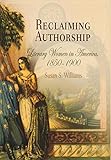Reclaiming Authorship : Literary Women in America, 185-19 / Susan S. Williams.
Material type: TextPublisher: Philadelphia : University of Pennsylvania Press, [2013]Copyright date: ©2006Description: 1 online resource (264 p.) : 17 illusContent type:
TextPublisher: Philadelphia : University of Pennsylvania Press, [2013]Copyright date: ©2006Description: 1 online resource (264 p.) : 17 illusContent type: - 9780812239423
- 9780812203899
- American literature -- 19th century -- History and criticism
- American literature -- Women authors -- History and criticism
- American literature -- Women authors
- American literature -- 19th century -- History and criticism
- Authorship
- Women and literature -- United States -- History -- 19th century
- Women and literature -- United States -- History -- 19th century
- Cultural Studies
- LITERARY CRITICISM / American / General
- Cultural Studies
- Literature
- 810.9928709034
- online - DeGruyter
- Issued also in print.
| Item type | Current library | Call number | URL | Status | Notes | Barcode | |
|---|---|---|---|---|---|---|---|
 eBook
eBook
|
Biblioteca "Angelicum" Pont. Univ. S.Tommaso d'Aquino Nuvola online | online - DeGruyter (Browse shelf(Opens below)) | Online access | Not for loan (Accesso limitato) | Accesso per gli utenti autorizzati / Access for authorized users | (dgr)9780812203899 |
Browsing Biblioteca "Angelicum" Pont. Univ. S.Tommaso d'Aquino shelves, Shelving location: Nuvola online Close shelf browser (Hides shelf browser)

|

|

|

|

|

|

|
||
| online - DeGruyter The Taste of Blood : Spirit Possession in Brazilian Candomble / | online - DeGruyter Literary Criticism : An Autopsy / | online - DeGruyter Singing the New Song : Literacy and Liturgy in Late Medieval England / | online - DeGruyter Reclaiming Authorship : Literary Women in America, 185-19 / | online - DeGruyter Bibliography and the Book Trades : Studies in the Print Culture of Early New England / | online - DeGruyter Women's Radical Reconstruction : The Freedmen's Aid Movement / | online - DeGruyter Exile and Return Among the East Timorese / |
Frontmatter -- Contents -- Preface -- 1. Defining Female Authorship -- 2. Writing in and out of the Home: Parlor Culture and Authorship -- 3. Authorizing Reception: Maria Cummins and The Lamplighter -- 4. Revising Romance: Louisa May Alcott, Hawthorne, and the Civil War -- 5. Contractual Authorship: Elizabeth Keckley and Mary Abigail Dodge -- 6. Elizabeth Stuart Phelps's Ethical Authorship -- 7. Epilogue: Amateurs and Professionals in Woolson and James -- Notes -- Bibliography -- Index -- Acknowledgments
restricted access online access with authorization star
http://purl.org/coar/access_right/c_16ec
There was, in the nineteenth century, a distinction made between "writers" and "authors," Susan S. Williams notes, the former defined as those who composed primarily from mere experience or observation rather than from the unique genius or imagination of the latter. If women were more often cast as writers than authors by the literary establishment, there also emerged in magazines, advice books, fictional accounts, and letters a specific model of female authorship, one that valorized "natural" feminine traits such as observation and emphasis on detail, while also representing the distance between amateur writing and professional authorship.Attending to biographical and cultural contexts and offering fresh readings of literary works, Reclaiming Authorship focuses on the complex ways writers such as Maria S. Cummins, Louisa May Alcott, Elizabeth Keckley, Mary Abigail Dodge, Elizabeth Stuart Phelps, and Constance Fenimore Woolson put this model of female authorship into practice. Williams shows how it sometimes intersected with prevailing notions of male authorship and sometimes diverged from them, and how it is often precisely those moments of divergence when authorship was reclaimed by women.The current trend to examine "women writers" rather than "authors" marks a full rotation of the circle, and "writers" can indeed be the more capacious term, embracing producers of everything from letters and diaries to published books. Yet certain nineteenth-century women made particular efforts to claim the title "author," Williams demonstrates, and we miss something of significance by ignoring their efforts.
Issued also in print.
Mode of access: Internet via World Wide Web.
In English.
Description based on online resource; title from PDF title page (publisher's Web site, viewed 24. Apr 2022)


